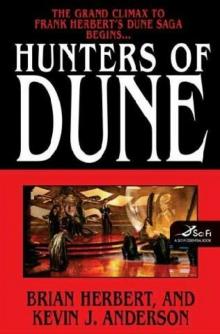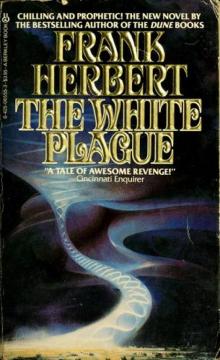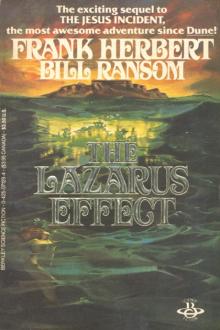- Home
- Frank Herbert
The Dragon in the Sea Page 3
The Dragon in the Sea Read online
Page 3
What has been the effect of losing Heppner, the other electronics officer? Will they resent his replacement?
Damn! Heppner was the wrong one to go! A case history with no apparent clues. Quiet childhood. Calm home life. Two sour notes: a broken love affair at age twenty-four; a psychotic blowup at age thirty-two. It should have been someone like Bonnett. The Unwanted. Or Captain Sparrow. The frustrated mathematician.
“Sleeping?”
It was Reed, the constant tutor.
“It’s three o’clock,” he said. “I brought a layout plan of the electronics shack on these Hell Divers.” He handed a blueprint to Ramsey, pointed as he spoke. “Bench here. Vise there. Wrench kit. Micro-lathe. Vacuum pumps. Testingboard plugs.”
“Okay, I can read.”
“You have to be able to plug into that test board in total darkness,” said Reed. He sat down squarely in the rattan chair lately occupied by Dr. Oberhausen. “Tomorrow you’re going to start training on a mock-up.”
“Tomorrow’s Saturday, Clint!” Ramsey glared at him.
“You don’t get out of here before 1800,” said Reed. He bent forward over the plan. “Now, concentrate on that plug layout. This here is emergency lighting. You’ll be expected to find it the first time.”
“What if it takes me two tries?”
Reed leaned back, turned his flinty gaze on Ramsey. “Mr. Ramsey, there’s something you should understand so thoroughly that it’s second nature to you.”
“Yeah? What’s that?”
“There is no such thing as a minor accident on a submarine.
Commander Sparrow trotted down the ramp from the tube landing, slowed as he stepped into the cavernous, floodlighted gloom of the underground submarine moorage. A fine mist of condensation from the rock ceiling far away in upper blackness beat against his face. He picked his way through the pattern of scurrying jitneys, darting, intent people. Ahead of him, the bulbous whale mound of his subtug rose above the pier; a 140-foot Wagnerian diva center stage beneath banks of floodlights.
Instructions from the final Security session jangled through his mind.
“Your crew has the top Security rating of the service, but you must remain alert for sleepers.”
“In my crew? Hell, man, I’ve known them all for years. Bonnett’s been with me eight years. Joe Garcia and I served together before the war. Heppner and—” His face had crimsoned. “What about the new E-officer?”
“You won’t need to worry about him. Now, the inspectors assure us there are no enemy signal devices aboard your boat.”
“Then why this gadget in my neck?”
“That’s just an added precaution.”
“What about this new man? What’s his E-rating?”
“He’s one of the best in the service. Here, look at his record.”
“Limited combat experience in gulf patrol! He’s practically a dryback!”
“But look at his E-rating.”
“Limited combat!”
A jitney driver shouted at Sparrow, bringing him out of his reverie. He glanced at his wrist watch: 0738—twentytwo minutes until castoff. His stomach tightened. He quickened his steps.
Damn Security’s last minute details!
Across the ebony velvet of the mooring pool he could see the glow tubes outlining the marine tunnel. Down the 160-mile slant of that tunnel, out into the underwater deeps of De Soto Canyon and the Gulf of Mexico—and beyond—ranged the enemy. An enemy grown suddenly, terrifyingly, one hundred percent effective against vessels such as his.
It came to Sparrow that the marine tunnel formed a grotesque birth canal. This cavern carved under a Georgia mountain was nestled in the earth like a fantastic womb. When they took their vessel out to do battle they were born into a terrible world that they did not want.
He wondered what BuPsych would think of an idea like that. They’d probably rate it as an indication of weakness, he thought. But why shouldn’t I have a weakness? Something about fighting a war a mile and a half under the ocean—the unrelenting pressure of water all around—exposes every weakness in a man. It’s the pressures. Constant pressures. Four men isolated in pressure, held in a plasteel prison as they are held in the prisons of their souls.
Another jitney scurried across Sparrow’s path. He dodged, looked up at his boat. He was close enough now to make out the name plate on the retractable conning tower high above him: Fenian Ram S1881. The boarding ramp swooped down from the tower in a long, graceful curve.
The dock captain, a moonfaced lieutenant commander in fatigues, hurried up to Sparrow, a check list in his hands.
“Captain Sparrow.”
Sparrow turned without stopping. “Yes? Oh, hullo, Myers. Are all the ready crews off?”
Myers fell into step beside him. “Most of them. You’ve lost weight, Sparrow.”
“Touch of dysentery,” said Sparrow. “Got some bad fruit up at Garden Glenn. Has my new electronics officer showed up?”
“Haven’t seen him. His gear came along earlier. Funny thing. There was a sealed box with his stuff. About so by so.” He gestured with his hands. “Cleared by Admiral Belland.”
“ComSec?”
“None other.”
“Why was it sealed?”
“It’s supposed to contain some highly delicate instruments to monitor your new long-range search equipment. It was sealed so no zealous searcher could foul the works.”
“Oh. I take it the new long-range gear is installed?”
“Yes. You’re battle-checking it.”
Sparrow nodded.
A cluster of men at the foot of the boarding ramp snapped to attention as the two officers approached. Sparrow and Myers stopped. Sparrow said, “At ease.”
Myers said, “Sixteen minutes, Captain.” He held out his hand, shook with Sparrow. “Good luck. Give’em hell.”
“Right,” said Sparrow.
Myers headed for the foot of the dock.
Sparrow turned toward a heavy-bodied, hawk-faced man beside the ramp, First Officer Bonnett. “Hi, Les.”
“Good to see you, Skipper,” said Bonnett. He tucked a clip board under his left arm, dismissed three ratings who were with him, turned back to Sparrow. “Where’d you and Rita go after the party?”
“Home,” said Sparrow.
“So’d we,” said Bonnett. He hooked a thumb toward the submarine behind him. “Final safety inspection’s completed. Spare gear checked out. But there’s a bit of a delay. Heppner’s replacement hasn’t reported.”
Sparrow cursed inwardly, felt a stomach-gripping surge of frustration-anger. “Where is he?”
Bonnett shrugged. “All I know is that Security called and said there might be some delay. I told them—”
“Security?”
“That’s right.”
“Suffering Jesus!” barked Sparrow. “Do they always have to wait until the last minute? They had me—” He broke off. That was classified.
“They said they’d do their best,” said Bonnett.
Sparrow pictured the complicated arrangements which would pass the Fenian Ram through their own defense network outward bound.
“It could take another day to set up a new passage time.”
Bonnett glanced at his wrist watch, took a deep breath. “I told them 0800 was the latest. They wouldn’t answer a damned one of my—” He fell silent as the ramp beside them rattled to descending footsteps.
Both men looked up, saw three figures coming down: two ratings carrying heavy-duty electronics detection gear, followed by a short, wiry man with dark Latin features. He wore stained service fatigues, carried a small electronic search box under his right arm.
“Don José Garcia,” said Sparrow.
Garcia shifted the search box to his left arm, stepped down to the dockside. “Skipper! Am I glad to see you!”
Sparrow moved back to permit the ratings to pass with their load, looked questioningly at the search box under Garcia’s arm.
Garcia shook his head. “For
God and Country,” he said. “But sometimes I think I overdraw my account with God.” He crossed himself. “The Security chaps have had us at this floating sewer pipe half the night. We’ve been over it from stem to stern four distinct times. Not a blip. Now, I say to you: they want me to make another search after we get underway down tunnel!” He raised his eyebrows. “I ask you!”
“We’ll have to do it,” said Sparrow. “I’ve allowed time before our first contact point for total deep-dive inspection.”
“I say,” said Garcia. He grinned. “You know, I’ve already gone and rigged for it.”
Sparrow answered the grin, felt some of the tensions inside him begin to unknot.
Bonnett glanced significantly at his watch. “Twelve min—”
The whine of a command jitney’s electric motor intruded upon him. All three men turned toward the sound. It came down the dark line of mooring slots, its single light casting an erratic Cyclops gleam upon the damp concrete. The jitney swerved up to the ramp, jerked to a stop. A redheaded man with round, innocent face sat beside the driver, clutching his uniform cap in his hands.
Sparrow saw ensign’s bars on the man’s collar, thought: That will be my new E-officer. Sparrow grinned at the man’s obvious relief up on a safe arrival. The recklessness of the base jitney drivers was a standard service joke.
The new man put his cap over his red hair, stepped out of the jitney. The machine rebounded from his weight. The driver whirled the jitney back the way they had come.
The ensign stepped up to Sparrow, saluted, said, “I’m Ramsey.”
Sparrow returned the salute, said, “Glad to have you aboard.”
Ramsey handed his service record to Sparrow, said, “No time to send these through channels.”
Sparrow passed the papers to Bonnett, said, “This is Mr. Bonnett, first officer.” He turned to Garcia. “Mr. Garcia, engineer.”
“Good to meet you,” said Ramsey.
“We’ll soon dissuade you of that illusion,” said Garcia.
Sparrow smiled, offered his hand to Ramsey, was surprised to feel strong muscle in the new man’s grip. The fellow just looked soft. Bonnett and Garcia also shook hands.
Ramsey was busy cataloguing his first visual impressions of the three men in the flesh. It seemed strange to be meeting these people for the first time when he felt that he already knew them. And that, he knew, would have to be concealed. Odd bits of knowledge about the personal lives of these men—even the names of their wives—could not be in the memory of a new man.
“Security said you might be delayed,” said Sparrow.
“What’s got Security on its ear?” asked Ramsey. “I thought they were going to dissect me.”
“We’ll discuss that later,” said Sparrow. He rubbed at the thin scar on his neck where the Security surgeons had imbedded the detection-system speaker. “Castoff is 0800. Mr. Garcia will take you aboard. Get into fatigues. You’ll be assisting him in a final spy-beam inspection as we get underway.”
“Yes, sir,” said Ramsey.
“Your gear came along hours ago,” said Garcia. He took Ramsey’s arm, propelled him toward the ramp. “Let’s get with it.” They hurried up the ramp.
Ramsey wondered when he could break away to examine his telemeter box. He felt an anxiety—a need to study the first records on Sparrow.
That mannerism of rubbing his neck, thought Ramsey. Extreme nervous tension well concealed. But it shows in the tight movements.
On the pier, Sparrow turned to look across the mooring basin at a string of moving lights. “Here comes our tow, Les.”
“Do you think we’ll make it, Skipper?”
“We always have.”
“Yes, but—”
“‘For now is our salvation nearer than when we believed,’” said Sparrow. “‘The night is far spent, the day is at hand: let us therefore cast off the works of darkness, and let us put on the armour of light.’” He looked at Bonnett. “Paul wrote that to the Romans two thousand years ago.”
“A pretty wise fellow,” said Bonnett.
A bos’n’s whistle sounded at the head of the dock. A swifty crane came darting up to take away the boarding ramp. Ratings hurried to attach the hooks, looked inquiringly at the two officers.
Men hurried along the pier, a new purposefulness in their movements. Sparrow swept his gaze over the scene. “We’re being asked to perform,” he said. He gestured for Bonnett to precede him up the ramp. “Like the man said: Let’s get with it.”
They climbed to the conning tower. Bonnett ducked for the cable rack which mounted the float for their TV periscope. As a matter of routine, he glanced at the housing, saw that it was secured for dive. He grasped the ladder arms, slid down into the subtug.
Sparrow remained topside. Around him, the mooring basin appeared a vast lake. He looked at the rock ceiling’s blackness.
There should be stars, he thought. Men should get one last look at stars before they go under the sea.
On the pier below, scurrying figures moved to cast off the magnetic grapples. For a moment, Sparrow felt like a useless pawn being thrown into a sacrifice position. There had been a time, he knew, when captains conned their vessels away from the dock, shouting orders through a megaphone. Now, it was all automatic—done by machines and by men who were like machines.
A surface tug swung up to their bow, slapped its tow grapples onto them. White water boiled from beneath the tug’s stern. The Fenian Ram resisted momentarily, as though reluctant to leave, then began a slow, ponderous movement out into the basin.
They cleared the slot, and another tug slid alongside their stern. The magna-shoe men leaped onto the Ram’s silencer planes, hitched the tow and guide cables of the long plastic tube which stretched out across the dark water of the basin. Their shouts came up to Sparrow in the tower like the clear noise of children. He tasted a sudden oil-tainted breeze and knew they had crossed the path of a ventilator duct.
No special fanfare, no brass bands, no ceremony for the departure of a raider, he thought. We are as a reed shaken with the wind. And what go we out into the wilderness to see? No John the Baptist awaits us. But it’s a kind of baptism all the same.
Somewhere in the darkness a klaxon hooted. Turn and identify the man next to you. Another Security scheme: Show your identification when the horn sounds. Damn Security! Out here I identify myself to my God and none other.
Sparrow looked astern at the set of the tow. Oil. War demanded the pure substance born in the sediment of rising continent. Vegetable oil wouldn’t do. War was no vegetarian. War was a carnivore.
The tow tug shifted to the side of the Ram and now the sub was being nosed into the traveler rack which would carry it down to the underwater canyon and the gulf.
Sparrow looked at the control console in the conning tower, and the green clear-away light. He flashed the standby signal to the tug below him and, with a practiced motion, touched the controls to retract the tower. It slid smoothly into the sub, its plasteel lid twisting into the groove seats.
A chest microphone hung beside the tower console. Sparrow slipped it on, spoke into it: “Rig for dive.”
He focused his attention on the dive board in front of him.
Back came Bonnett’s voice, robbed of life by the metallic mutes of the intercom: “Pressure in the hull.”
One by one, the lights on Sparrow’s dive board shifted from red to green. “Green board,” he said. “Stand by.” Now he could feel the hull pressure and another pressure in his stomach. He closed the signal circuit which told the outside crews that the subtug was ready to go down tunnel.
The Ram shifted, lurched. A dull clang resonated through the boat. Across the top of the dive board amber lights flashed: they were in the grip of the tunnel elevator. Twenty hours of free ride.
Sparrow grasped a handhold beside the dive board, swung down and out onto the engine-room catwalk. His feet made a slithering sound on the catwalk padding as he made his way aft, crawled through the control
-room door, dogged it behind him. His gaze paused for a moment on the hand-etched brass plate Heppner had attached beside the door—a quotation from some nineteenth-century pundit:
“No one but a crazy man would waste his time inventing a submarine and no one but a lunatic would go down in it if it were invented.”
Through the gulf shelf in the Florida elbow, De Soto Canyon slashes the soft peninsula limestone like a railroad cut: fourteen fathoms where it starts in Apalachee Bay, more than two hundred and sixty fathoms where it dives off into the ocean deeps south of Cape San Bias and east of Tampa.
The gulf exit of the marine tunnel opens into the canyon wall at fifty fathoms: a twilight world of waving fan kelp, red fingers of gorgonian coral, flashing sparkles of reefdwelling fish.
The Fenian Ram coasted out of the dark hole of the tunnel like a sea monster emerging from its lair, turned, scattering the fish, and slanted down to a resting place in the burnt-umber mud of the canyon bottom. A sonar pulse swept through the boat. Detectors in the triple hulls responded, registered on control gauges of the navigation deck.
Garcia’s clipped accent—oddly squeaking in the oxygen-high atmosphere—repeated the check list as he watched the Christmas tree lights of the main board. “ … no leaks, trim weights balanced, external salvage air clear and pressure holding, atmosphere free of nitrogen, TV eyes clear and seeing, TV periscope surfaced and seeing; periscope gyro checks with—” His laughter echoed through the intercom: “Seagull! It tried to land on the peri-box as I started to reel in. Lit on its fanny in the water.”
Bonnett’s crisp tones interrupted: “What’s it like topside, Joe?”
“Clear. Just daybreak. Going to be a good day for fishing.”
Sparrow’s voice rasped over the speakers: “Enough of that! Was there anyone up there to spot the gull’s flop? They could’ve seen our box.”
“Negative, Skipper.”
Sparrow said, “Les, give me the complete atmosphere check. Vampire gauges everyone. Follow the check. Report any deviations.”
The patient inspection continued.
Ramsey interrupted. “I’m in the induction-drive chamber. A lot of static here as I entered.”

 Direct Descent
Direct Descent The Ascension Factor
The Ascension Factor The Heaven Makers
The Heaven Makers Children of Dune
Children of Dune Old Rambling House
Old Rambling House Dune
Dune The Worlds of Frank Herbert
The Worlds of Frank Herbert The Jesus Incident
The Jesus Incident Heretics of Dune
Heretics of Dune Whipping Star
Whipping Star Dune Messiah
Dune Messiah Man of Two Worlds
Man of Two Worlds The Book of Frank Herbert
The Book of Frank Herbert Hunters Of Dune
Hunters Of Dune The Tactful Saboteur
The Tactful Saboteur Soul Catcher
Soul Catcher God Emperor of Dune
God Emperor of Dune The White Plague
The White Plague The Green Brain
The Green Brain The Godmakers
The Godmakers Sandworms of Dune
Sandworms of Dune Destination Void
Destination Void The Dosadi Experiment
The Dosadi Experiment Eye
Eye High-Opp
High-Opp The Eyes of Heisenberg
The Eyes of Heisenberg Missing Link
Missing Link Hellstrom's Hive
Hellstrom's Hive Chapterhouse: Dune
Chapterhouse: Dune The Santaroga Barrier
The Santaroga Barrier The Dragon in the Sea
The Dragon in the Sea Operation Haystack
Operation Haystack A Thorn in the Bush
A Thorn in the Bush Four Unpublished Novels
Four Unpublished Novels Dune dc-1
Dune dc-1 Jorj X. McKie 1 - Whipping Star
Jorj X. McKie 1 - Whipping Star DV 4 - The Ascension Factor
DV 4 - The Ascension Factor Frank Herbert - Dune Book 4 - God Emperor Of Dune
Frank Herbert - Dune Book 4 - God Emperor Of Dune ChapterHouse: Dune dc-6
ChapterHouse: Dune dc-6 The Ascension Factor w-4
The Ascension Factor w-4 A Game of Authors
A Game of Authors Children of Dune dc-3
Children of Dune dc-3 Destination: Void: Prequel to the Pandora Sequence
Destination: Void: Prequel to the Pandora Sequence The Collected Stories of Frank Herbert
The Collected Stories of Frank Herbert Dune Messiah dc-2
Dune Messiah dc-2 Frank Herbert - Dune Book 5 - Heretics of Dune
Frank Herbert - Dune Book 5 - Heretics of Dune DV 3 - The Lazarus Effect
DV 3 - The Lazarus Effect The Jesus Incident w-2
The Jesus Incident w-2 The Lazarus Effect w-3
The Lazarus Effect w-3 Frank Herbert
Frank Herbert The Ascension Factor: Pandora Sequence
The Ascension Factor: Pandora Sequence Dune (40th Anniversary Edition)
Dune (40th Anniversary Edition) The Dosadi Experiment c-2
The Dosadi Experiment c-2 The Lazarus Effect
The Lazarus Effect God Emperor of Dune dc-4
God Emperor of Dune dc-4 The Pandora Sequence: The Jesus Incident, the Lazarus Effect, the Ascension Factor
The Pandora Sequence: The Jesus Incident, the Lazarus Effect, the Ascension Factor The Green Brain (v4.0)
The Green Brain (v4.0) The Heaven Makers (v4.0)
The Heaven Makers (v4.0) Heretics of Dune dc-5
Heretics of Dune dc-5